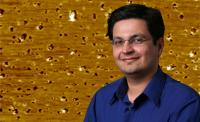May 13 2015
Rensselaer Polytechnic Institute (RPI) professor Nikhil Koratkar has been honored by the American Society of Mechanical Engineering (ASME) and Pi Tau Sigma for his pioneering work in the synthesis, characterization, and applications of one-dimensional and two-dimensional nanomaterials.
 Nikhil Koratkar
Nikhil Koratkar
The professional organizations recognized Koratkar, the John A. Clark and Edward T. Crossan Chair Professor in Engineering, with the Gustus L. Larson Memorial Award. The Larson award honors engineering graduates for outstanding achievement in mechanical engineering between 10 and 20 years after graduation.
In bestowing the award, the organizations cited Koratkar for “exceptional achievement in the science and technology of graphene and carbon nanotubes, leading to important breakthroughs in nanotechnology, energy, and sustainability.”
Koratkar will be formally recognized at the ASME Mechanical Engineering Congress and Exposition in Houston, Texas, on November 15. Funding for the award was provided from the ASME Ward S. and Editha Jacobs Fund. The award honors Gustus L. Larson, ASME fellow and founder of Pi Tau Sigma at the University of Wisconsin.
Koratkar’s research has focused on the synthesis, characterization, and application of nanoscale material systems. This includes graphene, carbon nanotubes, transition metal dichalcogenides, and hexagonal boron nitride, as well as metal and silicon nanostructures produced by a variety of techniques such as mechanical exfoliation, chemical vapor deposition, and oblique angle sputter and e-beam deposition. He is studying the fundamental mechanical, electrical, thermal, magnetic, and optical properties of these one-dimensional (1-D) and two-dimensional (2-D) materials and developing a variety of composites, coatings, and device applications of these low-dimensional materials.
He has published over 130 archival journal papers, including five in Nature series journals. His work in nanostructured materials for lithium-ion batteries has resulted in a new start-up company (Ener-Mat Technologies), which is aimed at commercializing graphene electrodes for next-generation energy storage solutions.
Among other honors, Koratkar won a 2004 National Science Foundation Faculty Early Career Development (CAREER) Award, and the Electrochemical Society’s SES Young Investigator Award in 2009. He has served as an editor of the Elsevier journal Carbon since 2010.